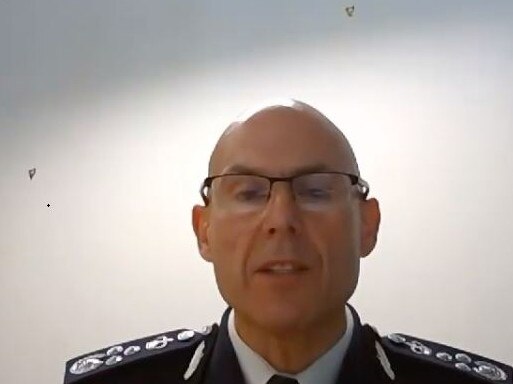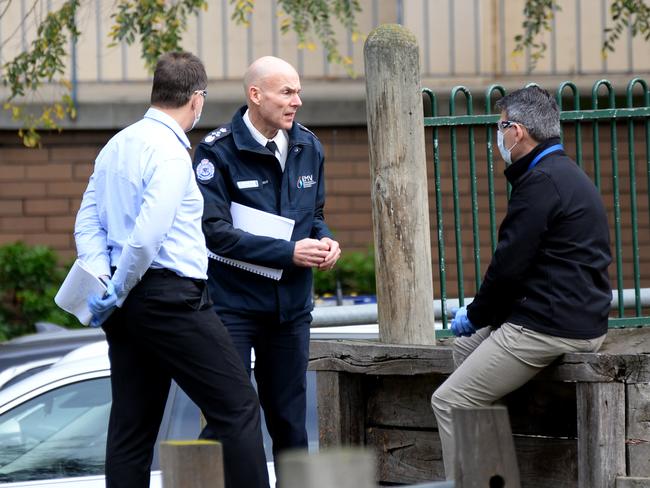Deputy Public Health Commander Dr Finn Romanes saw lack of unified plan in Victoria’s hotel quarantine program
A senior health official warned of ‘considerable risk’ to Victoria’s COVID-19 quarantine hotels and noticed there was a lack of ‘unified plan’. The revelation comes as Emergency Management Commissioner Andrew Crisp told the inquiry he “did not see a need for boots on the ground’’ from the ADF.
News
Don't miss out on the headlines from News. Followed categories will be added to My News.
A senior health official warned of “considerable risk” associated with the hotel quarantine scheme more than a week after it began operating, and called for urgent changes to clarify who was in charge.
Dr Finn Romanes, the Deputy Public Health Commander working on the COVID-19 outbreak in Victoria, sent an email to senior staff on April 9, and copied in colleagues including Chief Health Officer Brett Sutton and his deputy Annaliese van Diemen.
“There appears to bea lack of a unified planfor this program, and there is considerable concern that the lead roles have not had an opportunity to be satisfied there is a policy and set of processes to manage the healthcare and welfare of detainees, for whom this program is accountable,’’ he wrote.

“There are now a considerable complexity and considerable risk that unless governance and plans issues are addressed there will be a risk to the health and safety of detainees.’’
Under the headline of “governance’’, Dr Romanes said the Chief Health Officer and Deputy Chief Health Officer (Prof. Sutton and Dr van Diemen) were “formally requesting an urgent review governance of the mandatory quarantine (detention) programme, also known as Operation Soteria, to be conducted this afternoon, with new and clear arrangements to be established by 8pm this evening.’’
He said the new arrangements needed to show clearly who was leading the program and what the line of accountability was to the Deputy Chief Health Officer.
He also called for a single plan to be produced by 10am the next day covering arrangements for provision of healthcare and welfare to people in mandatory quarantine; compliance oversight and operations and logistics including accommodation and transport.
“The plan will need to show all processes and policy decisions, and manage health and safety of detainees,’’ he wrote.
“It should provide for ways that the Public Health Commander can receive up to date reports on the health and welfare of all detainees,’’ he said.
“We are very grateful for all the hard work of the team, and appreciate your help in advance for establishing these necessary steps in the governance and oversight of this program.’’
EMERGENCY CHIEF DOWNPLAYED NEED FOR ADF TROOPS IN HOTELS
On Tuesday, Emergency Management Commissioner Andrew Crisp told the hotel inquiry twice that he “did not see a need for (ADF) boots on the ground’’ in Victoria’s COVID-19 quarantine hotels.
He told the hotel quarantine inquiry on Tuesday he had no recollection of a key meeting or notes about private security being used in the botched program.
Audio recordings played to the inquiry of critical State Control Centre meetings on March 27 and March 28 show Mr Crisp downplayed the need for ADF resources.
Asked directly at that time about what role the ADF would play in hotel quarantine, Mr Crisp said: “I’d suggest at this stage we can manage this … at this stage we don’t see a need for boots on the ground”.

The next day, March 28, a senior ADF liaison officer is recorded as saying: “Andrew, just noting that the news tonight mentioned that the ADF would be patrolling the corridors of hotels – ah, not in Victoria.”
Mr Crisp replied: “Thanks John … I’ve said it before but I’ll say it again, at this point in time, we certainly don’t see the need for ADF boots on the ground in support of this operation.”
Counsel assisting the inquiry, Rachel Ellyard, asked Mr Crisp if he was aware, prior to the liaison officer mentioning it, that there were suggestions the ADF would have a role “walking corridors in hotels in New South Wales?’’
Mr Crisp said he could not recall.

The bombshell recordings come after Mr Crisp released a statement in August, saying he “did not seek nor did representatives of the ADF offer assistance as part of the hotel quarantine program’’.
In a much-anticipated appearance before inquiry chair Jennifer Coate, Mr Crisp was revealed to have provided three statements to the inquiry.
The third came after he forgot to detail a meeting he had with former Police Chief Commissioner Graham Ashton, Police Minister Lisa Neville and several bureaucrats earlier in the day on March 27.
He had previously said he found out about the hotel quarantine program when Prime Minister Scott Morrison announced it.
But in his third statement, he said he had now read his logbook and believed he had in fact found out about the program from Ms Neville.
He said he believed this “only based on the brief notes I made in my logbook on that day’’ and he had no recollection of any details of what was discussed at the meeting.
And he was unable to explain why he wrote “private security’’ in his logbook notes of the meeting.
Ms Ellyard put to him that Mr Ashton would give evidence later this week that Mr Crisp had told Mr Ashton that private security was going to be used.
This is in contrast to previous evidence given to the inquiry from several witnesses in which it was stated that private security was Victoria Police’s and Mr Ashton’s “preference.’’

The inquiry is yet to establish who made the decision to use private security instead of ADF or police.
Mr Crisp said he could not recall making those comments to Mr Ashton.
“I can only comment, Ms Ellyard, with the fact that I wrote ‘private security’ in my logbook, there was something there about private security. Whether I have said it or Minister Neville was briefed, I have no recollection of the actual conversation.’’
Mr Crisp said he learned sometime prior to the 4.30pm online SCC meeting on March 27 that the Department of Jobs, Precincts and Regions had been allocated the role of finding accommodation and security contractors, but he could not recall who told him or how he came to know.
“I guess it goes back to my state of mind when I went into that meeting and I believed that the DJPR had been tasked by Department of Premier and Cabinet with this operation and had already made those arrangements in relation to private security as one element of this particular operation,’’ he said.
The inquiry has been told quarantine breaches involving private security guards seeded 99 per cent of Victoria’s deadly second wave of COVID infections, which has killed more than 700 people.
Mr Crisp said he believed private security would have been a “suitable workforce’’ to use in the hotels.
“My thinking was, you know, well-trained, well-supervised private security in this type of role would have been efficient and effective.’’
But within days, Mr Crisp has been alerted of concerns about the performance of the security guards.
Later, on June 24, Mr Crisp said he made a request of the ADF to provide 850 troops, as the Department of Health and Human Services was working on options to replace the private security guards.
But he said he rescinded the request on June 25 after a conversation with the secretary of the Department of Justice and Community Safety, Rebecca Falkingham, after she explained to him “other resources’’ including police and protective services officers were being explored which would move more quickly.
In his third statement, he provided a copy of a text message he had sent to Assistant Commissioner Mick Grainger, after first receiving a phone call from Mr Ashton.
The text read: “I stepped out to speak to Graham … he made it clear in VSB (Victorian Secretaries Board) that private security is the first security option at hotels/motels and not police.’’
Later in cross-examination by Mr Ashton’s barrister Dan Star QC, Mr Crisp agreed he had no knowledge that Victoria Police had requested, recommended or even been consulted on, using private firms as the first line of security.
Audio from the March 28 meeting also revealed that Mr Crisp said the Department of Health was “in charge” of the hotel quarantine program. But Health Minister Jenny Mikakos on Tuesday said she was not responsible.
“I was not involved in signing off the governance structure or the operational plane of this program,” she said.
MORE NEWS
Cafe owner to challenge Melbourne’s curfew
Andrews’ hotel quarantine claim shattered
Regional Victoria to open up, glimmer of hope for Melbourne
Originally published as Deputy Public Health Commander Dr Finn Romanes saw lack of unified plan in Victoria’s hotel quarantine program
